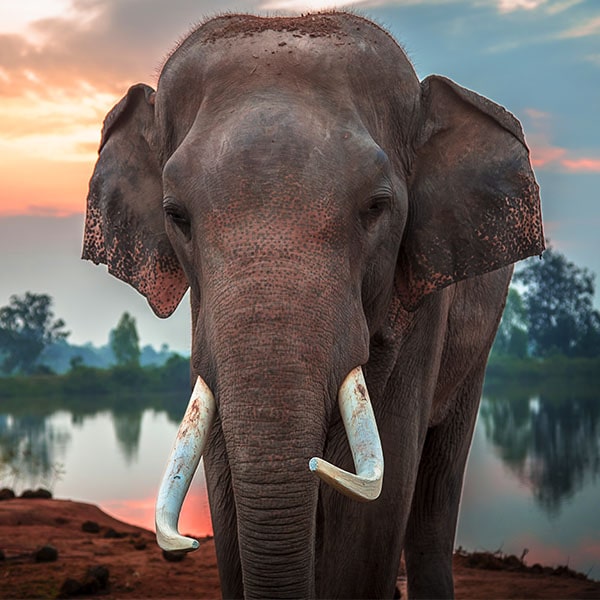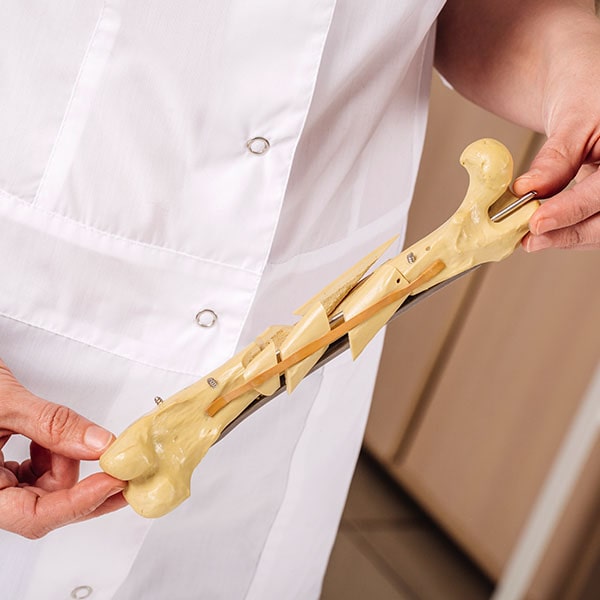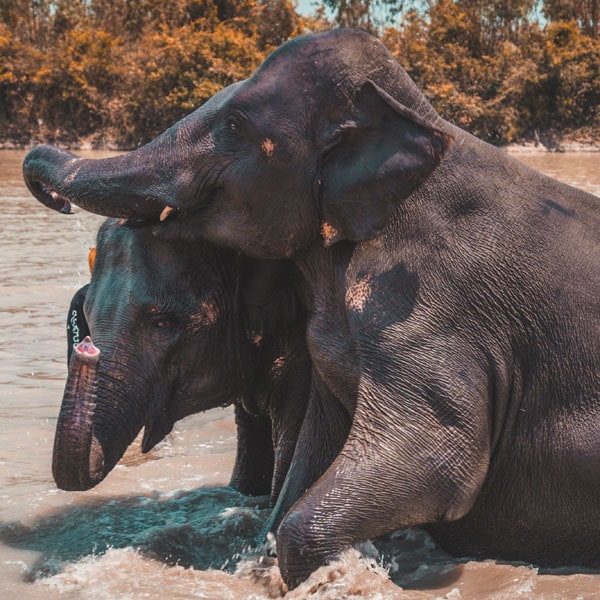Virtual Veterinary Academy Courses
Discover new skills, train with teaching veterinarians, and get a behind-the-scenes experience as you study veterinary medicine online. At your own pace, you can immerse yourself in the hands-on world of animal care and medicine in several disciplines from the comfort of home. You’ll also get valuable insight on how to pursue different careers within veterinary medicine.

Companion Animal Management
Dr. Kristina Perez, Loop Abroad’s full-time Veterinarian Instructor in Thailand, teaches this course that covers the anatomy, physiology, and health management of dogs and cats through a clinical lens.
Broken into 14 robust modules, the course is designed to give you an understanding of what it’s like to be a veterinarian and the types of cases they see on a daily basis. From anatomy, anesthesia, and CPR, to diagnoses, therapeutic techniques, surgeries, and nutrition, you’ll have a comprehensive introduction to the skills and techniques needed to succeed as a veterinarian. You will learn about animal behavior and anatomy, wellness visits and preventative care, diseases and emergency conditions by body region, diagnostic and therapeutic techniques, and so much more.
You will receive a foundation that will both help you start thinking critically and clinically about companion animal medicine and be useful as you continue to pursue your education and veterinary medicine career.

Elephant Medicine and Management
Led by Dr. Erica Ward, an elephant veterinarian, Head Veterinarian at Loop Abroad, and an adjunct professor at the University of Findlay in Ohio, this course was created to share what she has learned working with these lovable large animals and help promote the welfare and conservation of elephants around the globe.
Throughout the course, you’ll learn about their history and management, their unique physiology and anatomy, how to manage their behavior and welfare, and common diseases and medical conditions. From nutrition and foot care, to training techniques and conservation efforts, you’ll develop a broader understanding of these gentle giants and the unique nuances of caring for and treating them.
With more than 19 hours of instruction and two guest lectures that cover positive reinforcement training and conservation of elephants, you’ll gain a greater understanding and appreciation for this unique species.

Prosthetic Design: Biomedical Engineering in Vet & Human Medicine
Learn how to use engineering principles and design processes to solve health problems for humans and animals alike! During this course, you’ll refine your creativity, critical thinking, and complex problem-solving skills as you develop prosthetic technologies that are essential to restoring normal anatomical function and improving quality of life.
With 20 hours of video lesson instruction and 5 hours of guest lectures, you’ll be introduced to a wide range of topics, including basic principles of biomechanics, joints and motion in bipeds and quadrupeds, gait analysis, and more. You’ll hear the incredible strides being made in prosthetic design and the stories of the wildlife who benefit from these applications.
Soak in expert knowledge from incredible veterinarians and change-makers; Max Polyak (DVM)—sea turtle specialist, Erica Ward (DVM)—elephant specialist, Roberto Vecchio (DVM)—wildlife and animal dentistry specialist, and Albertus Coetzee—rehabilitation center and sanctuary founder. Learn directly from the vets, engineers, and doctors who design and build prosthetics every day in their practice – whether it’s a prosthetic leg for an elephant, a 3-D printed beak for a toucan, a wheelchair for a paraplegic dog, or the many prosthetics used by human amputees.
At your own pace, discover how biomechanics are used to create movement solutions for animals, resulting in life-changing treatment plans. Start by studying the foundations of bioengineering, biomechanics, and joint loading. Then apply these principles to understand human and animal prosthetics. As you learn about animal disability, amputation, prosthetic casting, rehabilitation, and more, your newfound skills will give you the foundations you need to be a part of the future of prosthetic technologies in animal science.

Veterinary Spanish 101
Designed for students who are new to Spanish or haven’t had the chance to use the Spanish they learned in school in real life, this course will help you be as confident in your language skills as you are in your passion for helping animals.
With over 46 video lessons, plus online flashcards, listening activities, and worksheets, this course will build your vocabulary and can be completed at your own pace. You’ll get to practice reading, writing, and speaking to enhance your conversation and listening skills.
Start by studying the foundations of greetings, culture, and Spanish grammar. Then, apply these principles right away as you practice your listening skills! The course includes video conversations between veterinarians and clients for you to listen to and practice understanding the grammar, vocabulary, and professionalism that would be expected of you in a veterinary clinic.
Taking the time to learn Spanish essentials will give you an edge for your future in veterinary medicine when collecting clinical history, communicating treatment options, diagnosing, and working with other Spanish-speakers. You will walk away with an understanding of the part language and culture play the pursuit of extending veterinary care to more animals globally, as well as the communication skills to be an active part of bringing that mission to life. From pets and strays to wildlife and endangered species, this course serves to remind animal-loving students of the importance of language in helping animals, connecting you to cultural perspectives and experiences you may not have at home.

Elephant Positive Reinforcement Training
How do you train an elephant to participate in medical care? The answer: positive reinforcement training. Increase safety for you and the animals you train, build mutual trust, and improve animal welfare while encouraging new emotional responses with techniques that can be used when training any animal. Learn key principles based on respect and freedom of choice to round out your foundational skills in veterinary medicine.
This online course allows you to continue your exploration of veterinary medicine on your own schedule and will prepare you for a veterinary career in, wildlife conservation, zookeeping, animal behavior, and more. During this course, you’ll expand your knowledge and your comfort zone, exercise your compassion, and refine your critical thinking skills and you practice the best training methods to build trust with animals in a variety of different settings.
Begin by studying the foundations of animal behavior, motivation, and the unique physiology of elephants. Then apply these learnings with training exercises and understand humans’ role in the relationship required for effective animal behavior management. You will learn to train and reinforce positive behavior in elephants to help them participate in their own well-being and healthcare.
This course includes 15 hours of expert instruction with field demonstrations of elephant training techniques, led by an expert animal behaviorist who brings over 20 years of experience. You’ll learn training principles based on trust, respect, and positive reinforcement techniques that can be applied to any animal. These transferrable skills will serve you well as you work with other animals in your future veterinary studies.
Tuition
- Companion Animal Management | $895
- Elephant Medicine and Management | $895
- Prosthetic Design: Biomedical Engineering in Vet & Human Medicine | $1,095
- Veterinary Spanish 101 | $595
- Elephant Positive Reinforcement Training | $595
All courses are asynchronous allowing the student to learn at their own pace within the course timeframe. Students may begin upon receiving their login information following their enrollment and complete the program at their pace within six months.
Virtual Veterinary Academy FAQs
Who are the Veterinary Academy virtual courses for?
Are courses synchronous or asynchronous?
Are there any system requirements?
How long is the course available?
Want to learn more? Fill out this form to schedule a call with one of our advisors
Complete the form below to receive more information about our WorldStrides Global Classroom.
By submitting this form, I confirm that I am at least 13 years of age and provide my written consent for WorldStrides to contact me using email or telephone—including the use of automated technology and prerecorded messages for calls to any wireless or residential telephone number I provide. This consent is not required to purchase goods or services.
**Available in the U.S. only. Message and data rates may apply. You may opt out of text messaging at any time by replying STOP.
For the safety of students, staff, and animals, not all animals may be touched or handled by participants. The teaching veterinarian and other professional staff members will advise students of the proper time, place, and method to handle animals when it is safe to do so.